The Interplay of Law and Ethics in Healthcare: A Case Study Analysis
VerifiedAdded on 2021/06/17
|9
|2796
|96
Report
AI Summary
This report delves into the intricate relationship between law and ethics within the medical profession, particularly focusing on a case study involving patient consent, advance care directives, and bioethical principles. The report explores the legal requirements for valid consent, the authority of medical professionals to initiate treatment, and the rationale behind obtaining consent to uphold patient rights and autonomy. It examines the options available for obtaining consent, especially when patients are incapacitated, and the role of substitute decision-makers. The report also addresses potential disagreements among decision-makers, the factors to consider when withdrawing life-sustaining measures, and the application of ethical principles such as autonomy and beneficence. Furthermore, it analyzes conflicts between stakeholders arising from these principles and applies the Kerridge model of problem-solving to resolve ethical dilemmas, concluding with the understanding of the fine line between law and ethics and the adoption of some ethics into law.
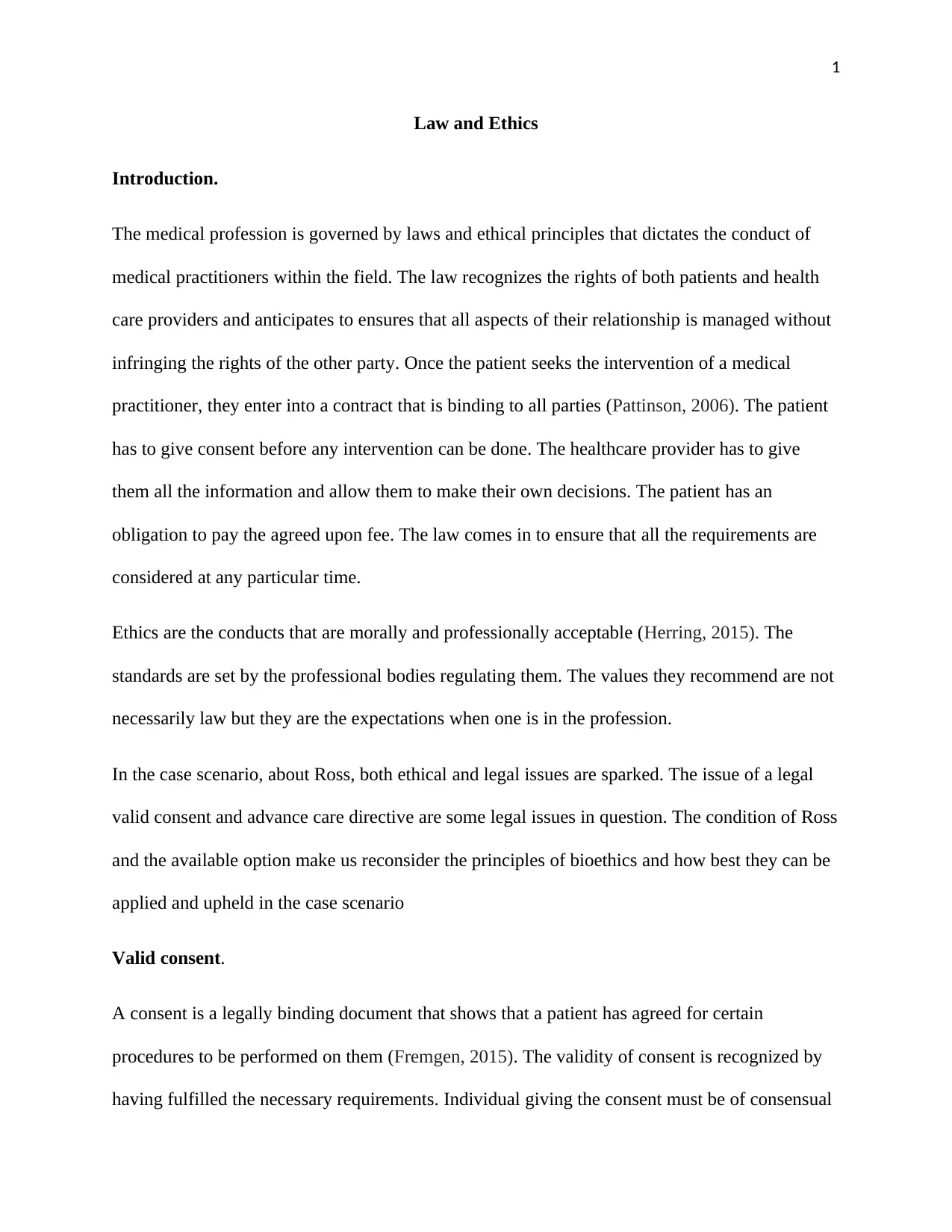
1
Law and Ethics
Introduction.
The medical profession is governed by laws and ethical principles that dictates the conduct of
medical practitioners within the field. The law recognizes the rights of both patients and health
care providers and anticipates to ensures that all aspects of their relationship is managed without
infringing the rights of the other party. Once the patient seeks the intervention of a medical
practitioner, they enter into a contract that is binding to all parties (Pattinson, 2006). The patient
has to give consent before any intervention can be done. The healthcare provider has to give
them all the information and allow them to make their own decisions. The patient has an
obligation to pay the agreed upon fee. The law comes in to ensure that all the requirements are
considered at any particular time.
Ethics are the conducts that are morally and professionally acceptable (Herring, 2015). The
standards are set by the professional bodies regulating them. The values they recommend are not
necessarily law but they are the expectations when one is in the profession.
In the case scenario, about Ross, both ethical and legal issues are sparked. The issue of a legal
valid consent and advance care directive are some legal issues in question. The condition of Ross
and the available option make us reconsider the principles of bioethics and how best they can be
applied and upheld in the case scenario
Valid consent.
A consent is a legally binding document that shows that a patient has agreed for certain
procedures to be performed on them (Fremgen, 2015). The validity of consent is recognized by
having fulfilled the necessary requirements. Individual giving the consent must be of consensual
Law and Ethics
Introduction.
The medical profession is governed by laws and ethical principles that dictates the conduct of
medical practitioners within the field. The law recognizes the rights of both patients and health
care providers and anticipates to ensures that all aspects of their relationship is managed without
infringing the rights of the other party. Once the patient seeks the intervention of a medical
practitioner, they enter into a contract that is binding to all parties (Pattinson, 2006). The patient
has to give consent before any intervention can be done. The healthcare provider has to give
them all the information and allow them to make their own decisions. The patient has an
obligation to pay the agreed upon fee. The law comes in to ensure that all the requirements are
considered at any particular time.
Ethics are the conducts that are morally and professionally acceptable (Herring, 2015). The
standards are set by the professional bodies regulating them. The values they recommend are not
necessarily law but they are the expectations when one is in the profession.
In the case scenario, about Ross, both ethical and legal issues are sparked. The issue of a legal
valid consent and advance care directive are some legal issues in question. The condition of Ross
and the available option make us reconsider the principles of bioethics and how best they can be
applied and upheld in the case scenario
Valid consent.
A consent is a legally binding document that shows that a patient has agreed for certain
procedures to be performed on them (Fremgen, 2015). The validity of consent is recognized by
having fulfilled the necessary requirements. Individual giving the consent must be of consensual
Paraphrase This Document
Need a fresh take? Get an instant paraphrase of this document with our AI Paraphraser
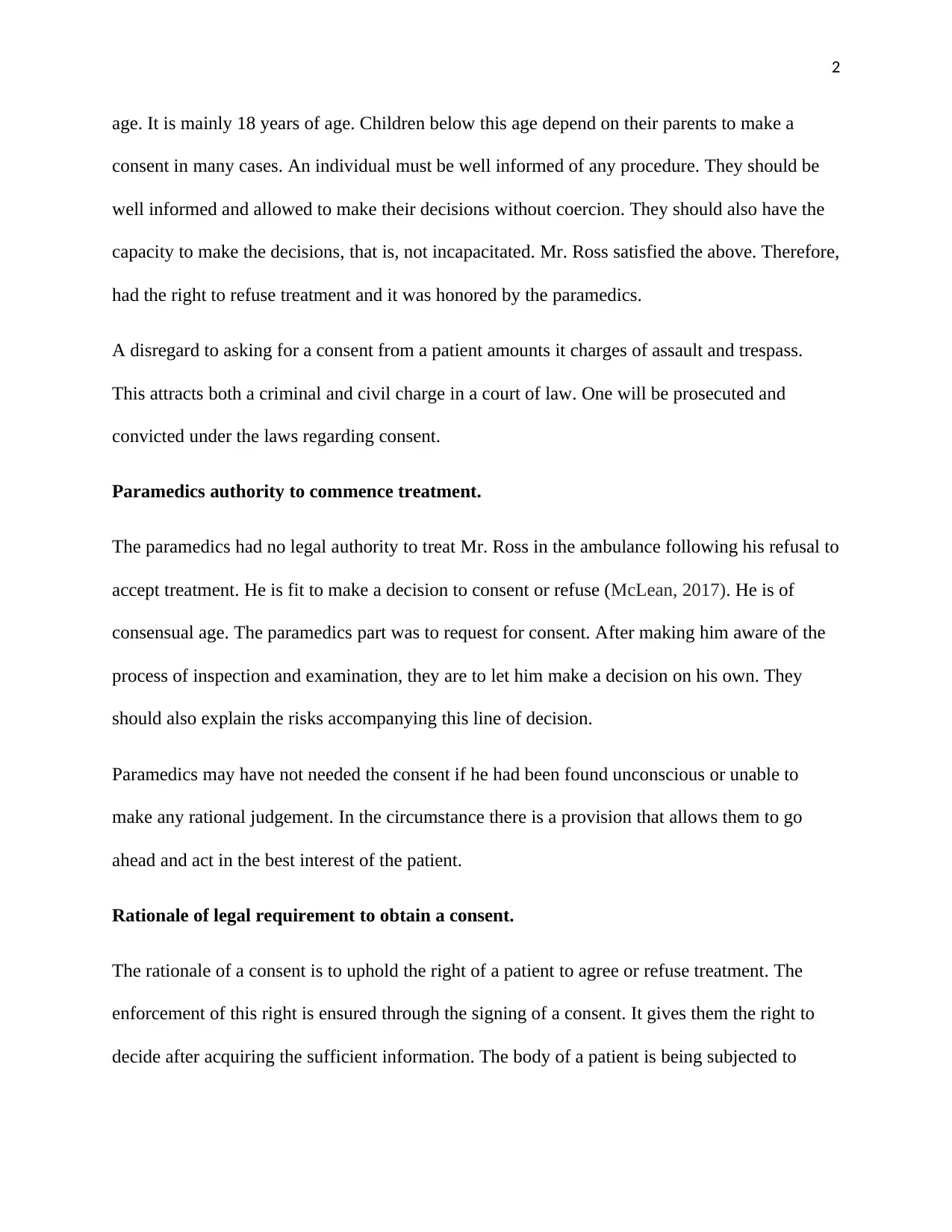
2
age. It is mainly 18 years of age. Children below this age depend on their parents to make a
consent in many cases. An individual must be well informed of any procedure. They should be
well informed and allowed to make their decisions without coercion. They should also have the
capacity to make the decisions, that is, not incapacitated. Mr. Ross satisfied the above. Therefore,
had the right to refuse treatment and it was honored by the paramedics.
A disregard to asking for a consent from a patient amounts it charges of assault and trespass.
This attracts both a criminal and civil charge in a court of law. One will be prosecuted and
convicted under the laws regarding consent.
Paramedics authority to commence treatment.
The paramedics had no legal authority to treat Mr. Ross in the ambulance following his refusal to
accept treatment. He is fit to make a decision to consent or refuse (McLean, 2017). He is of
consensual age. The paramedics part was to request for consent. After making him aware of the
process of inspection and examination, they are to let him make a decision on his own. They
should also explain the risks accompanying this line of decision.
Paramedics may have not needed the consent if he had been found unconscious or unable to
make any rational judgement. In the circumstance there is a provision that allows them to go
ahead and act in the best interest of the patient.
Rationale of legal requirement to obtain a consent.
The rationale of a consent is to uphold the right of a patient to agree or refuse treatment. The
enforcement of this right is ensured through the signing of a consent. It gives them the right to
decide after acquiring the sufficient information. The body of a patient is being subjected to
age. It is mainly 18 years of age. Children below this age depend on their parents to make a
consent in many cases. An individual must be well informed of any procedure. They should be
well informed and allowed to make their decisions without coercion. They should also have the
capacity to make the decisions, that is, not incapacitated. Mr. Ross satisfied the above. Therefore,
had the right to refuse treatment and it was honored by the paramedics.
A disregard to asking for a consent from a patient amounts it charges of assault and trespass.
This attracts both a criminal and civil charge in a court of law. One will be prosecuted and
convicted under the laws regarding consent.
Paramedics authority to commence treatment.
The paramedics had no legal authority to treat Mr. Ross in the ambulance following his refusal to
accept treatment. He is fit to make a decision to consent or refuse (McLean, 2017). He is of
consensual age. The paramedics part was to request for consent. After making him aware of the
process of inspection and examination, they are to let him make a decision on his own. They
should also explain the risks accompanying this line of decision.
Paramedics may have not needed the consent if he had been found unconscious or unable to
make any rational judgement. In the circumstance there is a provision that allows them to go
ahead and act in the best interest of the patient.
Rationale of legal requirement to obtain a consent.
The rationale of a consent is to uphold the right of a patient to agree or refuse treatment. The
enforcement of this right is ensured through the signing of a consent. It gives them the right to
decide after acquiring the sufficient information. The body of a patient is being subjected to
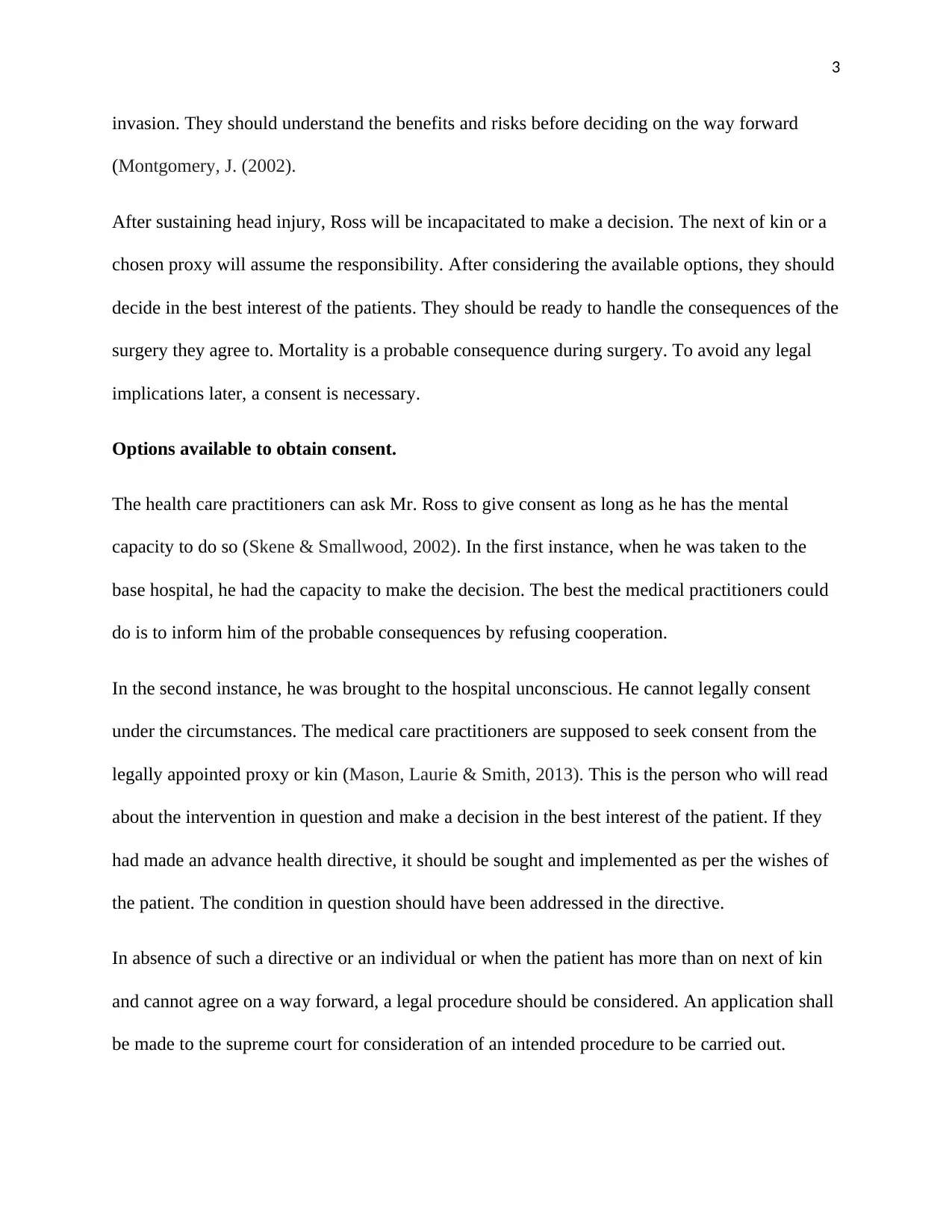
3
invasion. They should understand the benefits and risks before deciding on the way forward
(Montgomery, J. (2002).
After sustaining head injury, Ross will be incapacitated to make a decision. The next of kin or a
chosen proxy will assume the responsibility. After considering the available options, they should
decide in the best interest of the patients. They should be ready to handle the consequences of the
surgery they agree to. Mortality is a probable consequence during surgery. To avoid any legal
implications later, a consent is necessary.
Options available to obtain consent.
The health care practitioners can ask Mr. Ross to give consent as long as he has the mental
capacity to do so (Skene & Smallwood, 2002). In the first instance, when he was taken to the
base hospital, he had the capacity to make the decision. The best the medical practitioners could
do is to inform him of the probable consequences by refusing cooperation.
In the second instance, he was brought to the hospital unconscious. He cannot legally consent
under the circumstances. The medical care practitioners are supposed to seek consent from the
legally appointed proxy or kin (Mason, Laurie & Smith, 2013). This is the person who will read
about the intervention in question and make a decision in the best interest of the patient. If they
had made an advance health directive, it should be sought and implemented as per the wishes of
the patient. The condition in question should have been addressed in the directive.
In absence of such a directive or an individual or when the patient has more than on next of kin
and cannot agree on a way forward, a legal procedure should be considered. An application shall
be made to the supreme court for consideration of an intended procedure to be carried out.
invasion. They should understand the benefits and risks before deciding on the way forward
(Montgomery, J. (2002).
After sustaining head injury, Ross will be incapacitated to make a decision. The next of kin or a
chosen proxy will assume the responsibility. After considering the available options, they should
decide in the best interest of the patients. They should be ready to handle the consequences of the
surgery they agree to. Mortality is a probable consequence during surgery. To avoid any legal
implications later, a consent is necessary.
Options available to obtain consent.
The health care practitioners can ask Mr. Ross to give consent as long as he has the mental
capacity to do so (Skene & Smallwood, 2002). In the first instance, when he was taken to the
base hospital, he had the capacity to make the decision. The best the medical practitioners could
do is to inform him of the probable consequences by refusing cooperation.
In the second instance, he was brought to the hospital unconscious. He cannot legally consent
under the circumstances. The medical care practitioners are supposed to seek consent from the
legally appointed proxy or kin (Mason, Laurie & Smith, 2013). This is the person who will read
about the intervention in question and make a decision in the best interest of the patient. If they
had made an advance health directive, it should be sought and implemented as per the wishes of
the patient. The condition in question should have been addressed in the directive.
In absence of such a directive or an individual or when the patient has more than on next of kin
and cannot agree on a way forward, a legal procedure should be considered. An application shall
be made to the supreme court for consideration of an intended procedure to be carried out.
⊘ This is a preview!⊘
Do you want full access?
Subscribe today to unlock all pages.

Trusted by 1+ million students worldwide
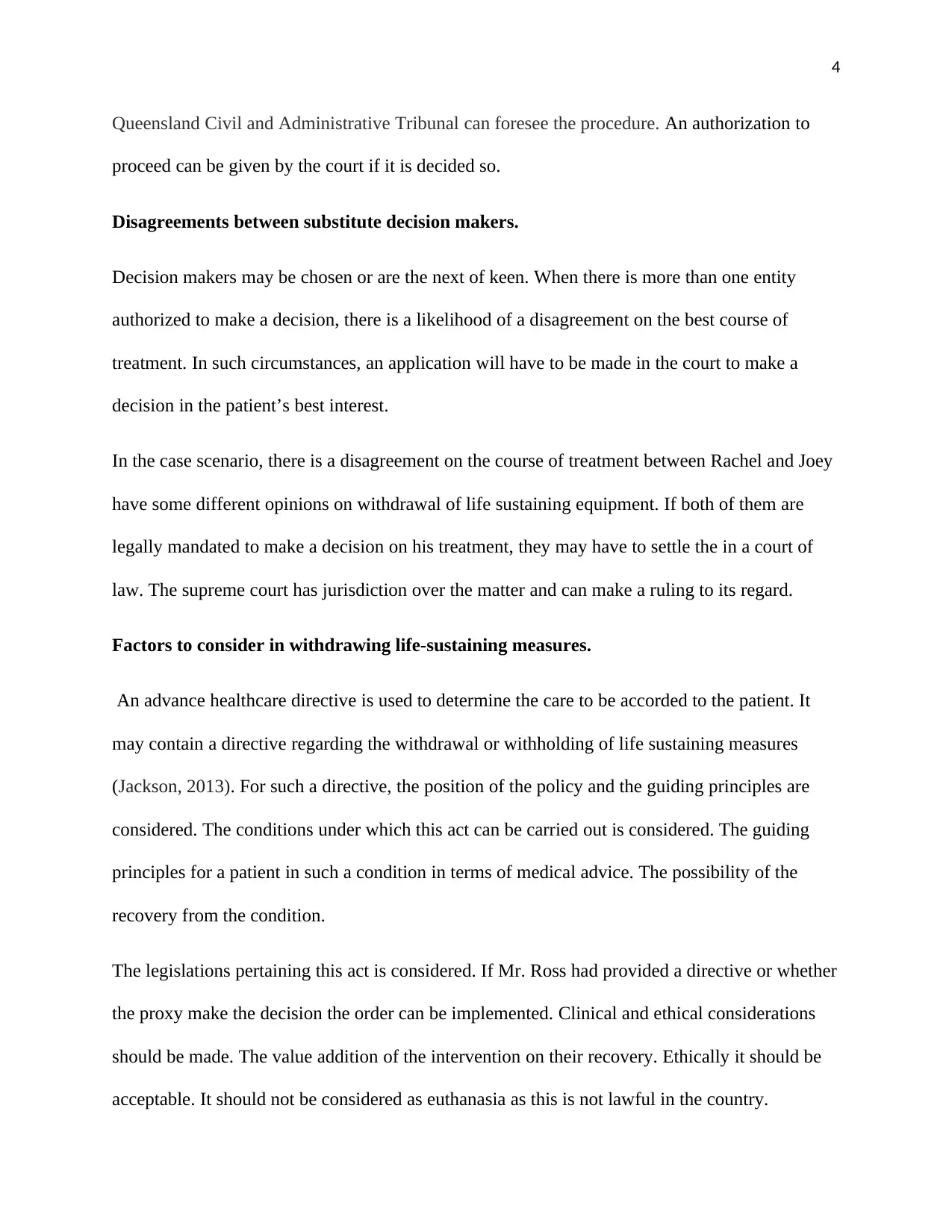
4
Queensland Civil and Administrative Tribunal can foresee the procedure. An authorization to
proceed can be given by the court if it is decided so.
Disagreements between substitute decision makers.
Decision makers may be chosen or are the next of keen. When there is more than one entity
authorized to make a decision, there is a likelihood of a disagreement on the best course of
treatment. In such circumstances, an application will have to be made in the court to make a
decision in the patient’s best interest.
In the case scenario, there is a disagreement on the course of treatment between Rachel and Joey
have some different opinions on withdrawal of life sustaining equipment. If both of them are
legally mandated to make a decision on his treatment, they may have to settle the in a court of
law. The supreme court has jurisdiction over the matter and can make a ruling to its regard.
Factors to consider in withdrawing life-sustaining measures.
An advance healthcare directive is used to determine the care to be accorded to the patient. It
may contain a directive regarding the withdrawal or withholding of life sustaining measures
(Jackson, 2013). For such a directive, the position of the policy and the guiding principles are
considered. The conditions under which this act can be carried out is considered. The guiding
principles for a patient in such a condition in terms of medical advice. The possibility of the
recovery from the condition.
The legislations pertaining this act is considered. If Mr. Ross had provided a directive or whether
the proxy make the decision the order can be implemented. Clinical and ethical considerations
should be made. The value addition of the intervention on their recovery. Ethically it should be
acceptable. It should not be considered as euthanasia as this is not lawful in the country.
Queensland Civil and Administrative Tribunal can foresee the procedure. An authorization to
proceed can be given by the court if it is decided so.
Disagreements between substitute decision makers.
Decision makers may be chosen or are the next of keen. When there is more than one entity
authorized to make a decision, there is a likelihood of a disagreement on the best course of
treatment. In such circumstances, an application will have to be made in the court to make a
decision in the patient’s best interest.
In the case scenario, there is a disagreement on the course of treatment between Rachel and Joey
have some different opinions on withdrawal of life sustaining equipment. If both of them are
legally mandated to make a decision on his treatment, they may have to settle the in a court of
law. The supreme court has jurisdiction over the matter and can make a ruling to its regard.
Factors to consider in withdrawing life-sustaining measures.
An advance healthcare directive is used to determine the care to be accorded to the patient. It
may contain a directive regarding the withdrawal or withholding of life sustaining measures
(Jackson, 2013). For such a directive, the position of the policy and the guiding principles are
considered. The conditions under which this act can be carried out is considered. The guiding
principles for a patient in such a condition in terms of medical advice. The possibility of the
recovery from the condition.
The legislations pertaining this act is considered. If Mr. Ross had provided a directive or whether
the proxy make the decision the order can be implemented. Clinical and ethical considerations
should be made. The value addition of the intervention on their recovery. Ethically it should be
acceptable. It should not be considered as euthanasia as this is not lawful in the country.
Paraphrase This Document
Need a fresh take? Get an instant paraphrase of this document with our AI Paraphraser
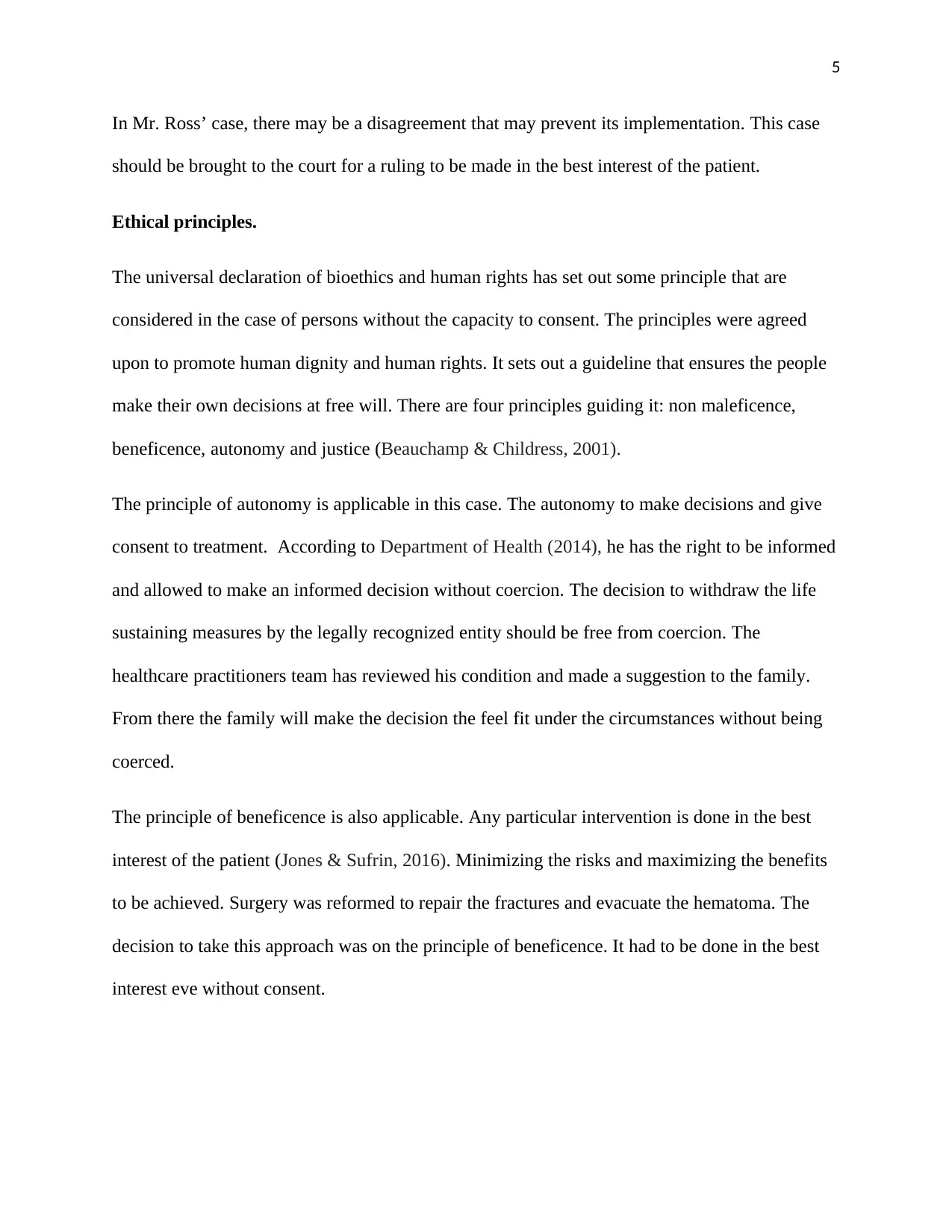
5
In Mr. Ross’ case, there may be a disagreement that may prevent its implementation. This case
should be brought to the court for a ruling to be made in the best interest of the patient.
Ethical principles.
The universal declaration of bioethics and human rights has set out some principle that are
considered in the case of persons without the capacity to consent. The principles were agreed
upon to promote human dignity and human rights. It sets out a guideline that ensures the people
make their own decisions at free will. There are four principles guiding it: non maleficence,
beneficence, autonomy and justice (Beauchamp & Childress, 2001).
The principle of autonomy is applicable in this case. The autonomy to make decisions and give
consent to treatment. According to Department of Health (2014), he has the right to be informed
and allowed to make an informed decision without coercion. The decision to withdraw the life
sustaining measures by the legally recognized entity should be free from coercion. The
healthcare practitioners team has reviewed his condition and made a suggestion to the family.
From there the family will make the decision the feel fit under the circumstances without being
coerced.
The principle of beneficence is also applicable. Any particular intervention is done in the best
interest of the patient (Jones & Sufrin, 2016). Minimizing the risks and maximizing the benefits
to be achieved. Surgery was reformed to repair the fractures and evacuate the hematoma. The
decision to take this approach was on the principle of beneficence. It had to be done in the best
interest eve without consent.
In Mr. Ross’ case, there may be a disagreement that may prevent its implementation. This case
should be brought to the court for a ruling to be made in the best interest of the patient.
Ethical principles.
The universal declaration of bioethics and human rights has set out some principle that are
considered in the case of persons without the capacity to consent. The principles were agreed
upon to promote human dignity and human rights. It sets out a guideline that ensures the people
make their own decisions at free will. There are four principles guiding it: non maleficence,
beneficence, autonomy and justice (Beauchamp & Childress, 2001).
The principle of autonomy is applicable in this case. The autonomy to make decisions and give
consent to treatment. According to Department of Health (2014), he has the right to be informed
and allowed to make an informed decision without coercion. The decision to withdraw the life
sustaining measures by the legally recognized entity should be free from coercion. The
healthcare practitioners team has reviewed his condition and made a suggestion to the family.
From there the family will make the decision the feel fit under the circumstances without being
coerced.
The principle of beneficence is also applicable. Any particular intervention is done in the best
interest of the patient (Jones & Sufrin, 2016). Minimizing the risks and maximizing the benefits
to be achieved. Surgery was reformed to repair the fractures and evacuate the hematoma. The
decision to take this approach was on the principle of beneficence. It had to be done in the best
interest eve without consent.
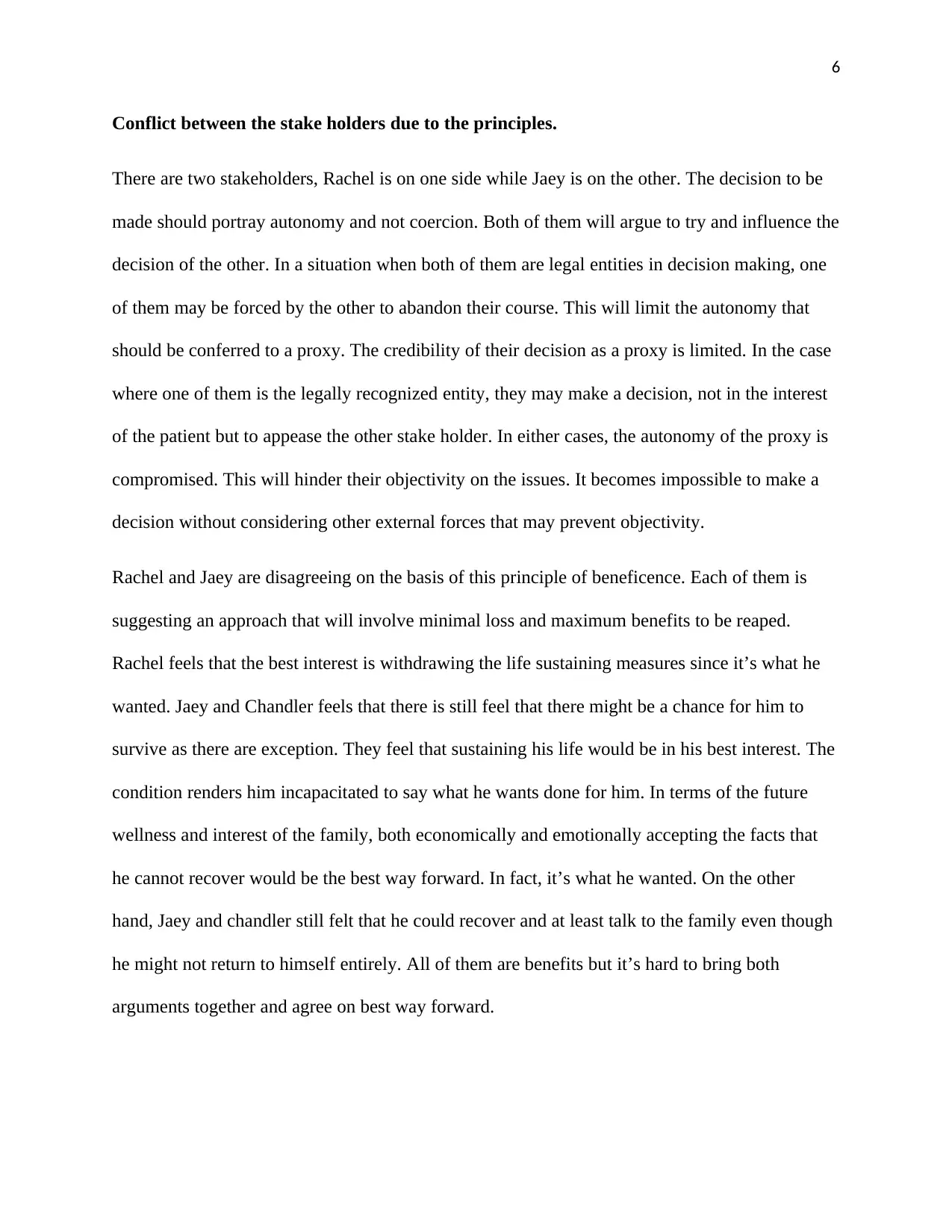
6
Conflict between the stake holders due to the principles.
There are two stakeholders, Rachel is on one side while Jaey is on the other. The decision to be
made should portray autonomy and not coercion. Both of them will argue to try and influence the
decision of the other. In a situation when both of them are legal entities in decision making, one
of them may be forced by the other to abandon their course. This will limit the autonomy that
should be conferred to a proxy. The credibility of their decision as a proxy is limited. In the case
where one of them is the legally recognized entity, they may make a decision, not in the interest
of the patient but to appease the other stake holder. In either cases, the autonomy of the proxy is
compromised. This will hinder their objectivity on the issues. It becomes impossible to make a
decision without considering other external forces that may prevent objectivity.
Rachel and Jaey are disagreeing on the basis of this principle of beneficence. Each of them is
suggesting an approach that will involve minimal loss and maximum benefits to be reaped.
Rachel feels that the best interest is withdrawing the life sustaining measures since it’s what he
wanted. Jaey and Chandler feels that there is still feel that there might be a chance for him to
survive as there are exception. They feel that sustaining his life would be in his best interest. The
condition renders him incapacitated to say what he wants done for him. In terms of the future
wellness and interest of the family, both economically and emotionally accepting the facts that
he cannot recover would be the best way forward. In fact, it’s what he wanted. On the other
hand, Jaey and chandler still felt that he could recover and at least talk to the family even though
he might not return to himself entirely. All of them are benefits but it’s hard to bring both
arguments together and agree on best way forward.
Conflict between the stake holders due to the principles.
There are two stakeholders, Rachel is on one side while Jaey is on the other. The decision to be
made should portray autonomy and not coercion. Both of them will argue to try and influence the
decision of the other. In a situation when both of them are legal entities in decision making, one
of them may be forced by the other to abandon their course. This will limit the autonomy that
should be conferred to a proxy. The credibility of their decision as a proxy is limited. In the case
where one of them is the legally recognized entity, they may make a decision, not in the interest
of the patient but to appease the other stake holder. In either cases, the autonomy of the proxy is
compromised. This will hinder their objectivity on the issues. It becomes impossible to make a
decision without considering other external forces that may prevent objectivity.
Rachel and Jaey are disagreeing on the basis of this principle of beneficence. Each of them is
suggesting an approach that will involve minimal loss and maximum benefits to be reaped.
Rachel feels that the best interest is withdrawing the life sustaining measures since it’s what he
wanted. Jaey and Chandler feels that there is still feel that there might be a chance for him to
survive as there are exception. They feel that sustaining his life would be in his best interest. The
condition renders him incapacitated to say what he wants done for him. In terms of the future
wellness and interest of the family, both economically and emotionally accepting the facts that
he cannot recover would be the best way forward. In fact, it’s what he wanted. On the other
hand, Jaey and chandler still felt that he could recover and at least talk to the family even though
he might not return to himself entirely. All of them are benefits but it’s hard to bring both
arguments together and agree on best way forward.
⊘ This is a preview!⊘
Do you want full access?
Subscribe today to unlock all pages.

Trusted by 1+ million students worldwide
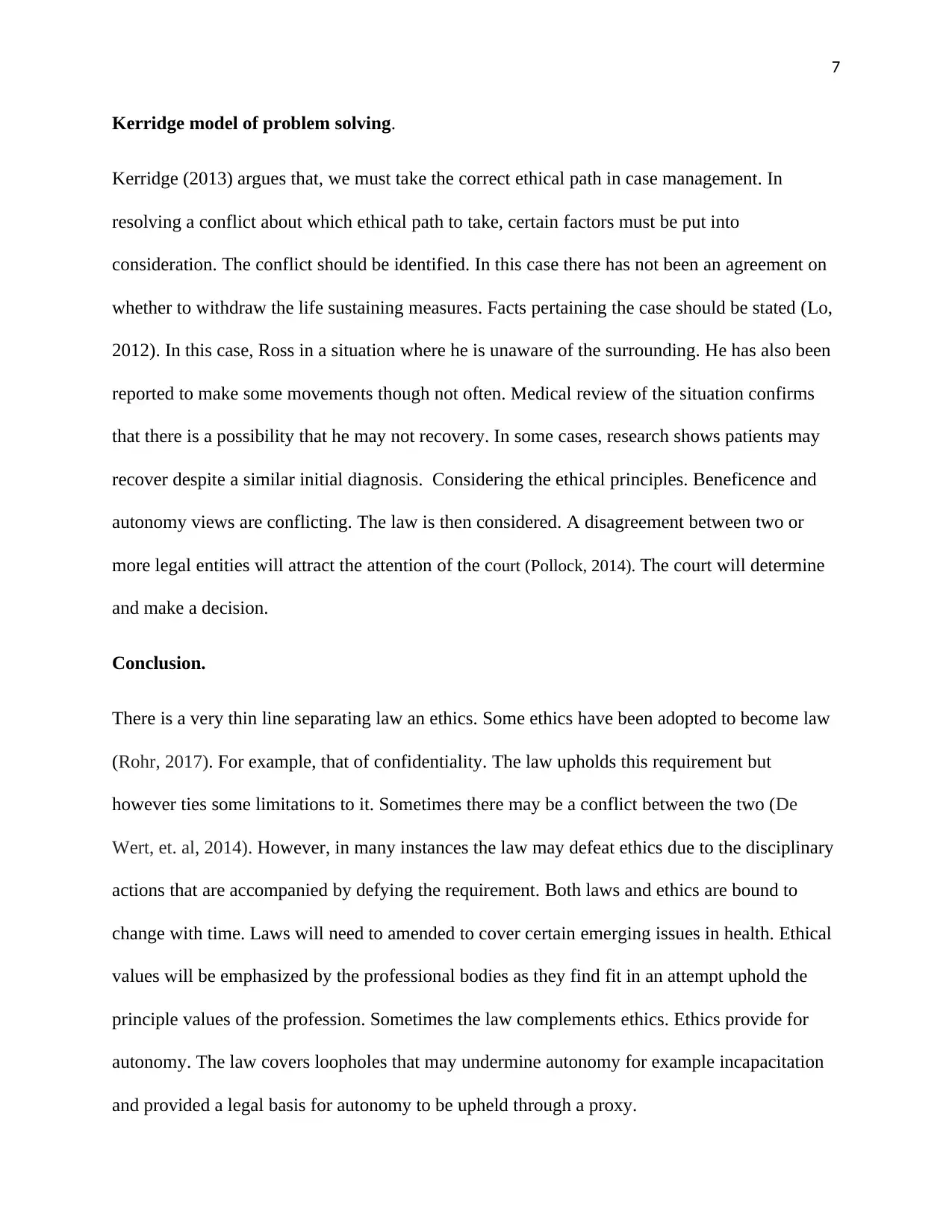
7
Kerridge model of problem solving.
Kerridge (2013) argues that, we must take the correct ethical path in case management. In
resolving a conflict about which ethical path to take, certain factors must be put into
consideration. The conflict should be identified. In this case there has not been an agreement on
whether to withdraw the life sustaining measures. Facts pertaining the case should be stated (Lo,
2012). In this case, Ross in a situation where he is unaware of the surrounding. He has also been
reported to make some movements though not often. Medical review of the situation confirms
that there is a possibility that he may not recovery. In some cases, research shows patients may
recover despite a similar initial diagnosis. Considering the ethical principles. Beneficence and
autonomy views are conflicting. The law is then considered. A disagreement between two or
more legal entities will attract the attention of the court (Pollock, 2014). The court will determine
and make a decision.
Conclusion.
There is a very thin line separating law an ethics. Some ethics have been adopted to become law
(Rohr, 2017). For example, that of confidentiality. The law upholds this requirement but
however ties some limitations to it. Sometimes there may be a conflict between the two (De
Wert, et. al, 2014). However, in many instances the law may defeat ethics due to the disciplinary
actions that are accompanied by defying the requirement. Both laws and ethics are bound to
change with time. Laws will need to amended to cover certain emerging issues in health. Ethical
values will be emphasized by the professional bodies as they find fit in an attempt uphold the
principle values of the profession. Sometimes the law complements ethics. Ethics provide for
autonomy. The law covers loopholes that may undermine autonomy for example incapacitation
and provided a legal basis for autonomy to be upheld through a proxy.
Kerridge model of problem solving.
Kerridge (2013) argues that, we must take the correct ethical path in case management. In
resolving a conflict about which ethical path to take, certain factors must be put into
consideration. The conflict should be identified. In this case there has not been an agreement on
whether to withdraw the life sustaining measures. Facts pertaining the case should be stated (Lo,
2012). In this case, Ross in a situation where he is unaware of the surrounding. He has also been
reported to make some movements though not often. Medical review of the situation confirms
that there is a possibility that he may not recovery. In some cases, research shows patients may
recover despite a similar initial diagnosis. Considering the ethical principles. Beneficence and
autonomy views are conflicting. The law is then considered. A disagreement between two or
more legal entities will attract the attention of the court (Pollock, 2014). The court will determine
and make a decision.
Conclusion.
There is a very thin line separating law an ethics. Some ethics have been adopted to become law
(Rohr, 2017). For example, that of confidentiality. The law upholds this requirement but
however ties some limitations to it. Sometimes there may be a conflict between the two (De
Wert, et. al, 2014). However, in many instances the law may defeat ethics due to the disciplinary
actions that are accompanied by defying the requirement. Both laws and ethics are bound to
change with time. Laws will need to amended to cover certain emerging issues in health. Ethical
values will be emphasized by the professional bodies as they find fit in an attempt uphold the
principle values of the profession. Sometimes the law complements ethics. Ethics provide for
autonomy. The law covers loopholes that may undermine autonomy for example incapacitation
and provided a legal basis for autonomy to be upheld through a proxy.
Paraphrase This Document
Need a fresh take? Get an instant paraphrase of this document with our AI Paraphraser
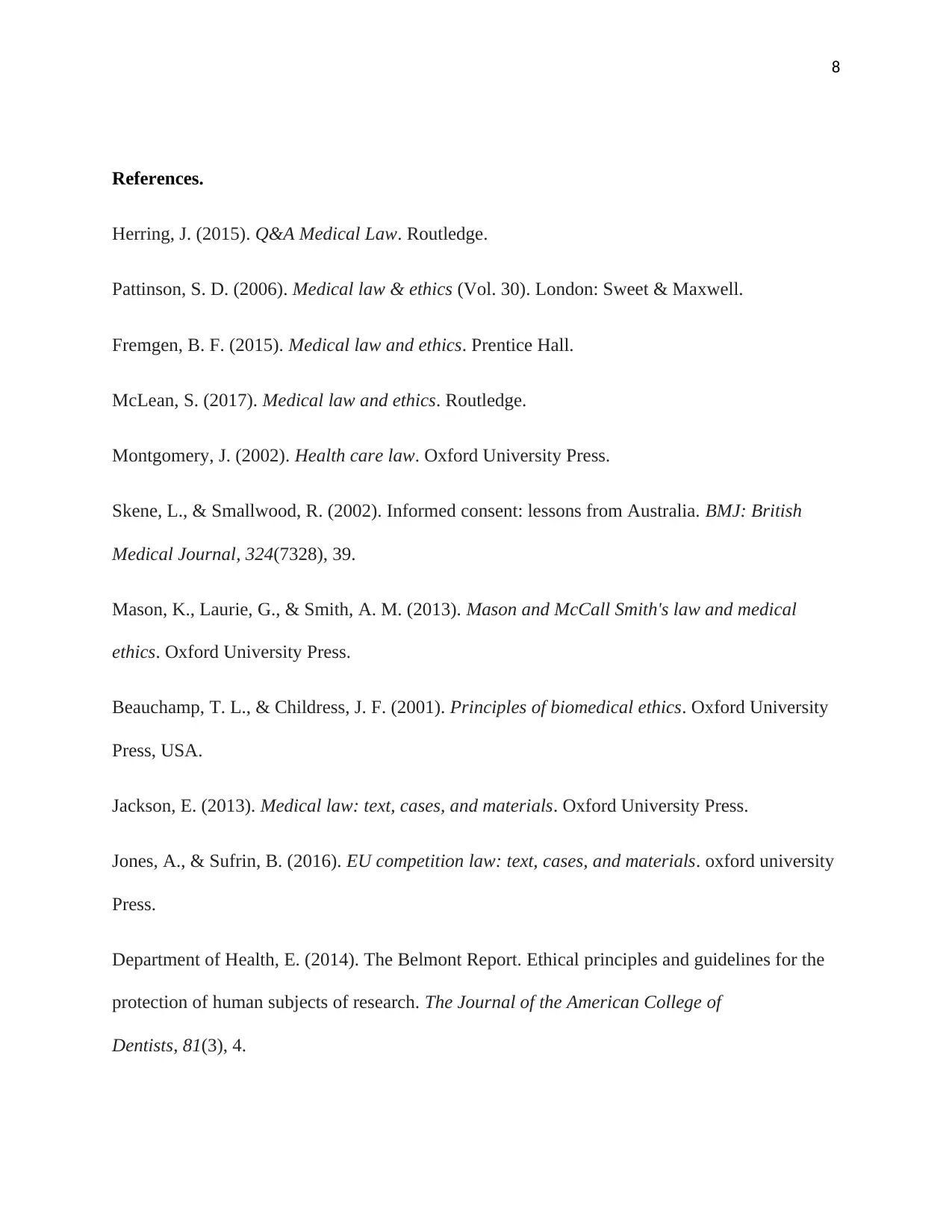
8
References.
Herring, J. (2015). Q&A Medical Law. Routledge.
Pattinson, S. D. (2006). Medical law & ethics (Vol. 30). London: Sweet & Maxwell.
Fremgen, B. F. (2015). Medical law and ethics. Prentice Hall.
McLean, S. (2017). Medical law and ethics. Routledge.
Montgomery, J. (2002). Health care law. Oxford University Press.
Skene, L., & Smallwood, R. (2002). Informed consent: lessons from Australia. BMJ: British
Medical Journal, 324(7328), 39.
Mason, K., Laurie, G., & Smith, A. M. (2013). Mason and McCall Smith's law and medical
ethics. Oxford University Press.
Beauchamp, T. L., & Childress, J. F. (2001). Principles of biomedical ethics. Oxford University
Press, USA.
Jackson, E. (2013). Medical law: text, cases, and materials. Oxford University Press.
Jones, A., & Sufrin, B. (2016). EU competition law: text, cases, and materials. oxford university
Press.
Department of Health, E. (2014). The Belmont Report. Ethical principles and guidelines for the
protection of human subjects of research. The Journal of the American College of
Dentists, 81(3), 4.
References.
Herring, J. (2015). Q&A Medical Law. Routledge.
Pattinson, S. D. (2006). Medical law & ethics (Vol. 30). London: Sweet & Maxwell.
Fremgen, B. F. (2015). Medical law and ethics. Prentice Hall.
McLean, S. (2017). Medical law and ethics. Routledge.
Montgomery, J. (2002). Health care law. Oxford University Press.
Skene, L., & Smallwood, R. (2002). Informed consent: lessons from Australia. BMJ: British
Medical Journal, 324(7328), 39.
Mason, K., Laurie, G., & Smith, A. M. (2013). Mason and McCall Smith's law and medical
ethics. Oxford University Press.
Beauchamp, T. L., & Childress, J. F. (2001). Principles of biomedical ethics. Oxford University
Press, USA.
Jackson, E. (2013). Medical law: text, cases, and materials. Oxford University Press.
Jones, A., & Sufrin, B. (2016). EU competition law: text, cases, and materials. oxford university
Press.
Department of Health, E. (2014). The Belmont Report. Ethical principles and guidelines for the
protection of human subjects of research. The Journal of the American College of
Dentists, 81(3), 4.
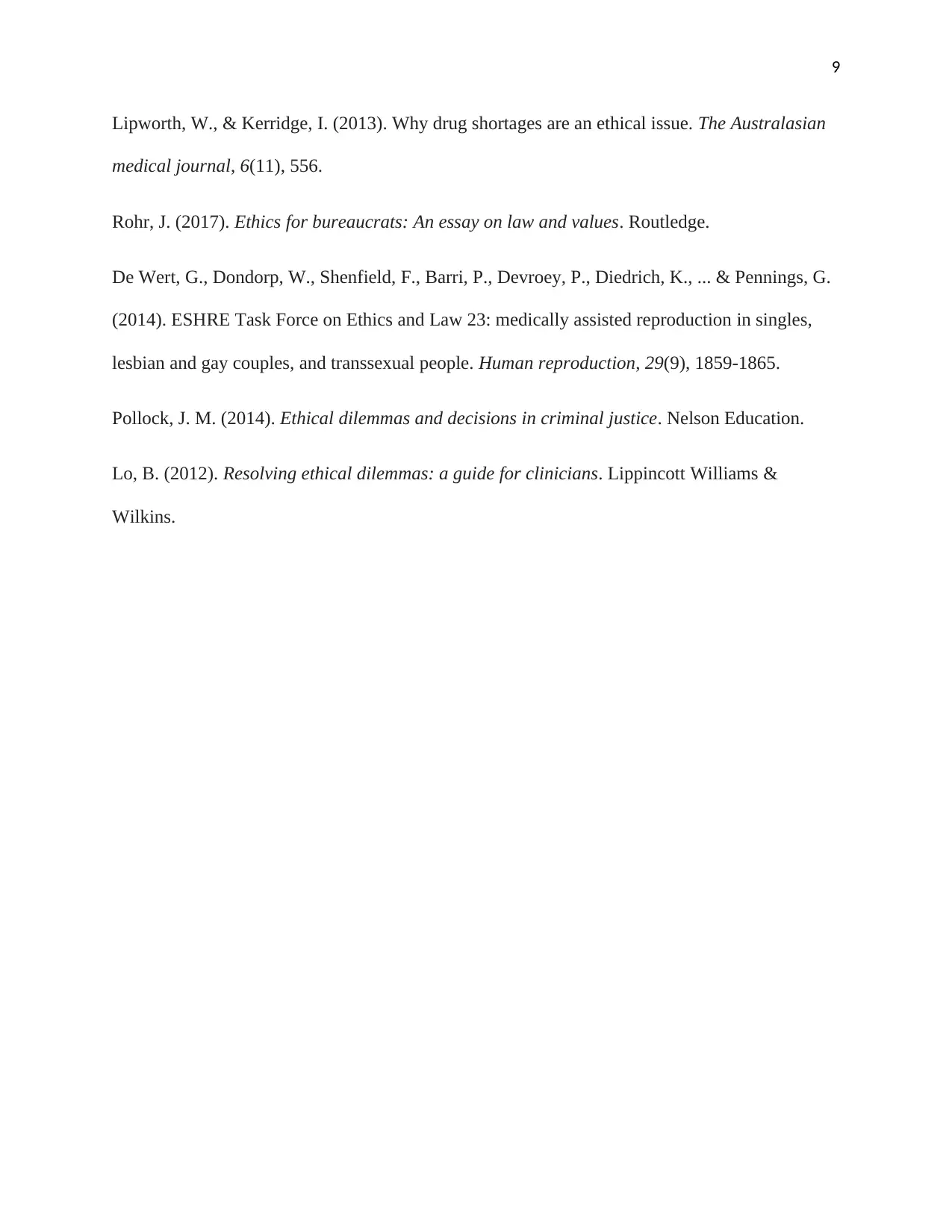
9
Lipworth, W., & Kerridge, I. (2013). Why drug shortages are an ethical issue. The Australasian
medical journal, 6(11), 556.
Rohr, J. (2017). Ethics for bureaucrats: An essay on law and values. Routledge.
De Wert, G., Dondorp, W., Shenfield, F., Barri, P., Devroey, P., Diedrich, K., ... & Pennings, G.
(2014). ESHRE Task Force on Ethics and Law 23: medically assisted reproduction in singles,
lesbian and gay couples, and transsexual people. Human reproduction, 29(9), 1859-1865.
Pollock, J. M. (2014). Ethical dilemmas and decisions in criminal justice. Nelson Education.
Lo, B. (2012). Resolving ethical dilemmas: a guide for clinicians. Lippincott Williams &
Wilkins.
Lipworth, W., & Kerridge, I. (2013). Why drug shortages are an ethical issue. The Australasian
medical journal, 6(11), 556.
Rohr, J. (2017). Ethics for bureaucrats: An essay on law and values. Routledge.
De Wert, G., Dondorp, W., Shenfield, F., Barri, P., Devroey, P., Diedrich, K., ... & Pennings, G.
(2014). ESHRE Task Force on Ethics and Law 23: medically assisted reproduction in singles,
lesbian and gay couples, and transsexual people. Human reproduction, 29(9), 1859-1865.
Pollock, J. M. (2014). Ethical dilemmas and decisions in criminal justice. Nelson Education.
Lo, B. (2012). Resolving ethical dilemmas: a guide for clinicians. Lippincott Williams &
Wilkins.
⊘ This is a preview!⊘
Do you want full access?
Subscribe today to unlock all pages.

Trusted by 1+ million students worldwide
1 out of 9
Related Documents
Your All-in-One AI-Powered Toolkit for Academic Success.
+13062052269
info@desklib.com
Available 24*7 on WhatsApp / Email
![[object Object]](/_next/static/media/star-bottom.7253800d.svg)
Unlock your academic potential
Copyright © 2020–2026 A2Z Services. All Rights Reserved. Developed and managed by ZUCOL.




